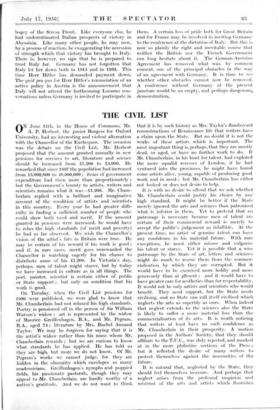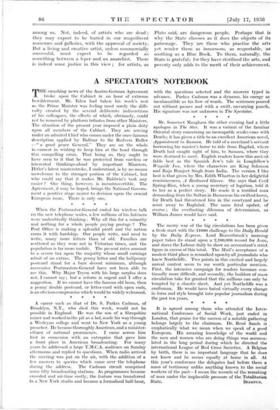THE CIVIL LIST
ON ...Tune 11th, in the House of Commons, Mr. A. P. Herbert, the junior Burgess for Oxford University, had an interesting and violent altercation with the Chancellor of the Exchequer. The occasion was the debate on the Civil List. Mr. Herbert proposed that the amount granted annually in new pensions for services to art, literature and science should be increased from £1,200 to £4,000. He remarked that since 1837 the population had increased from .15,000,000 to 40,000,000 ; items of government expenditure had risen more than proportionately ; but the Government's bounty to artists, writers and scientists remains what it was-11,200. Mr. Cham- berlain replied with a brilliant and imaginative account of the condition of artists and 'scientists in this country. Every year he had greater diffi- culty in finding a sufficient number of people who could show both need and merit. If the amount granted in pensions were increased, he would have to relax the. high standards (of merit and poverty) he had so far observed. We wish the Chancellor's vision of the artist's fate in Britain were true. He may be certain of • his reward if his work is good ; and if, in rare cases, merit goes unrewarded the Chancellor is _watching eagerly for his chance to distribute some of his £1,200. In Victoria's. day, perhaps, men of talent might starve, but by today we have increased in culture as in all things. The poet, painter, scientist is certain either of public or State support ; but only on condition that his work is good.
On . Tuesday, when the Civil List pensions for 1936 were published, we were glad to know that Mr. Chamberlain had not relaxed his high standards. Poetry is pensioned off in the person of Sir William Watson's widow ; art is represented by the widow of Maurice.• Greiffenhagen, R.A., and Mr. Pegram, R.A., aged- .74 ;. literature by Mrs. Rachel Armand Taylor. We may be forgiven for saying that it is the artist's. widow rather than his muse whom Mr. Chamberlain. rewards ; but we are curious to know what standards he has. applied. He has told us they are high, but more we do not know. Of Mr. Pegram's works we cannot judge, for they are hidden in 'the obscurity which envelopes so many academicians. Greiffenhagen's nymphs and poppied fields, his passionate pastorals, though they may appeal to Mr. Chamberlain, are hardly worthy of a nation's gratitude. And we do not want to think that it is by such history as Mrs. Taylor's flamboyant reconstructions of Renaissance life that writers have a claim upon the State. But no doubt it is not the works of these artists which is important. The most important thing is, perhaps, that they are mostly dead, or aged, or have no further work to do. If Mr. Chamberlain, in his hunt for talent, had explored the more squalid recesses of London, if he had ventured into the provinces, he might have found some artists alive, young, capable of producing good work and in need ; but Mr. Chamberlain has either not looked or does not desire to help.
It is with no desire to offend that we ask whether Mr. Chamberlain could justify his choice by any high standard. It might be better if the State merely ignored the arts and sciences than patronised what is inferior in them. Yet to pretend that no patronage is necessary because men of talent are certain of their commercial reward is merely to accept the public's judgement as infallible. At the present time, no artist of genuine talent can have any confidence in his material future. With rare exceptions, he must either misuse and vulgarise his talent or starve. Yet it is possible that a wise patronage by the State of art, letters and sciences might do much to rescue them from the commer- cialisation by which they arc corrupted. But it would have to be exercised more boldly and more generously than at pi'esent ; _and- it would have to have greater care for aesthetics than for respectability. It would not be only artists and scientists who would benefit. They need support, but the State needs civilising, and no State can call itself civilised which neglects the arts as superbly as ours. When indeed that neglect extends to the sciences also the State is likely to suffer a more- material loss than the commercialisation of its arts. It is worth noticing that writers at least have no such confidence as Mr. Chamberlain in their prosperity. A motion proposed in the Authors' Society, that they should affiliate to the TALC., was duly rejected,,and mocked at in the more philistine sections of the Press ; but it reflected the desire of many writers to protect themselves . against the insecurities of the future.
It is natural that, neglected by the State, they should feel themselves insecure. And perhaps that neglect arises from the profound suspicion and mistrust of the arts and artists which flourishes among us. Not, indeed, of artists who are dead ; they may expect to be buried in our magnificent museums and galleries, with the approval of society. But a living and creative artist, unless commercially successful, must expect to be regarded as something between a leper and an anarchist. There is indeed some justice in this view ; for artists, as Plato said, are dangerous people. Perhaps that is why the State chooses as it does the objects of its patronage. They 'are those who practise the arts yet render them as innocuous, as respectable, as soothing as a Blue Book. To them, naturally, the State is grateful ; for they have sterilised the arts, and poverty only adds to the merit of their achievement.















































 Previous page
Previous page